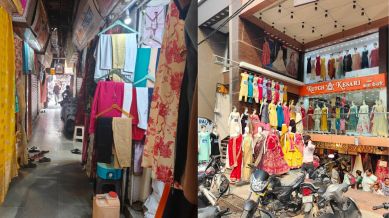Stay updated with the latest - Click here to follow us on Instagram
‘How can we be boycotted in our own country?’: Indore’s glittering cloth market feels impact of BJP leader’s diktat asking Muslims to leave
Indore BJP unit vice-president Aklavya Gaur, who also heads a right-wing outfit and is the son of the Indore-4 MLA, issued an ultimatum to the community to leave the market by October 25

At the glittering Sitla Mata Bazaar in Madhya Pradesh’s Indore, Muslim shopowners with skyrocketing debts work the phone lines to sell their stock, salesmen beg for a job, and tailors rush to wrap up last-minute orders – the last they are likely to see here.
For more than a century, Sitla Mata Bazaar has maintained an intricate harmony between the predominantly Hindu owners and Muslim salesmen, tailors and helpers, who formed the backbone of this cloth market. The market is known for its jam-packed lanes crammed with sari bundles, lehengas in cascading hues and shopfronts no wider than a door, yet stacked floor to ceiling with fabric.
monthly limit of free stories.
with an Express account.
That equilibrium began to crack when Indore BJP unit vice-president Aklavya Gaur, who also heads the right-wing outfit, Hindu Rakshak, issued an ultimatum to the Muslim community to leave the market by October 25. The son of Indore-4 MLA Malini Gaur, Aklavya first made news when he and his supporters stormed a cafe in Indore in January 2021, accusing Muslim comedian Munawar Faruqui and those performing with him of mocking Hindu deities and filing a police complaint.
Asked why he issued the ultimatum at the market, Aklavya claimed, “For the last two years, there have been complaints of women being harassed. They approached the local MLA (his mother Malini), but not the police, due to the sensitive nature of the case.”
On why the Muslim community as a whole was targeted, he said, “I was in a meeting with the local traders, and they decided to remove people indulging in such acts. They decided to take action against a particular community.”
The Muslim community has sent two complaints over the economic boycott to the police. Indore range-4 DCP Anand Kalagdi said, “We have deputed a DCP-rank officer to probe the complaints. One complaint was addressed to me, and another to the additional DCP. We will probe the complaints in a fair manner.” Asked if the police were probing Aklavya’s role, he said, “You will get to know in two weeks’ time.”
The impact
At the market, the economic hit has been immediate. A 25-year-old entrepreneur who recently took a loan of Rs 10 lakh to start his own saree store is distraught as he sells his stock at a loss. The man, who did not wish to be named for fear of further repercussions, said, “I am going to be in debt. How can we be boycotted in our own country? Where should I go now?”
Empathising with him is Gaurav (48), under whose tutelage he learnt the tricks of the trade. “This Dusshera, business was slow. We had to fire some staff, and celebrations were muted. This Hindu-Muslim controversy has wiped out the business,” he said.
Several Hindu shopkeepers resisted the diktat and staged small demonstrations to defend longtime colleagues; others complied out of fear. Vishnu Vijayvargiya, a trader, said that “our best labourers, our most skilled salesmen, have been here since they were children”. “Because of this ban, even women from their families have stopped coming to buy,” he said.
“We’ve been here nine years. We started as helpers, then as salesmen, and finally managed to run our own small shops,” said a Muslim trader, adjusting a stack of saris as he spoke. “Now, 95 per cent of us are gone. We’re forced to sell at throwaway rates. Cloth worth a rupee, we’re letting go for 25 paisa. I’ve already lost Rs 25 lakh and have four loans on my head.”
The past four months have already been lean, traders say. “We had hoped to make up for it during Dussehra. Normally, the business would touch Rs 50,000-60,000 a day. This season, nothing,” said a 36-year-old owner of Maheshwari sarees.
Another person who has been forced to move out said, “We are afraid of even protesting; we don’t want to be booked in a police case. Forty years we’ve worked here. This market is a hundred years old. Sarees, lehengas and finishing work is our life. I am finding work at the adjacent markets; my friends have left their rented homes.”
For salesmen, who anyway had modest salaries, the impact is particularly hard. “I started when I was 15, learning how to fold, how to talk to customers. Now all three of us from my shop are out of work,” said a man in his 30s, holding up his phone to show pictures of shelves once crowded with fabric. “My flat’s EMI is Rs 21,500. We’re looking for odd jobs, anything. One of my friends has started helping in a back-alley godown, shifting cartons.”